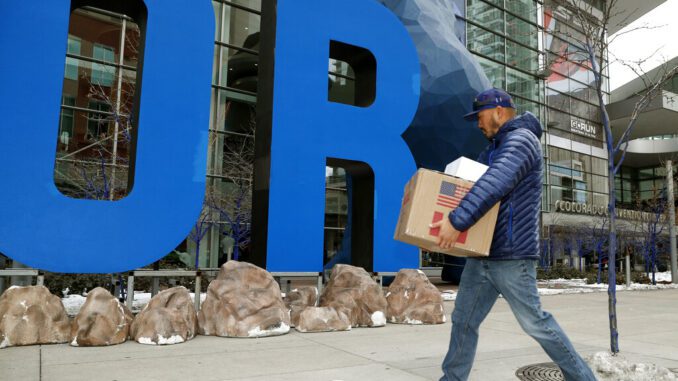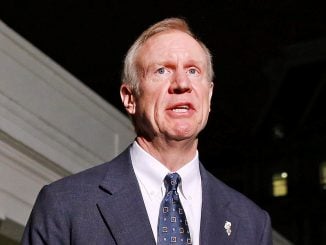
DENVER — The Outdoor Retailer trade show is moving back to Salt Lake City from Denver next year despite threats from an environmental group and big-name recreation companies of a boycott, the event’s organizer announced Wednesday.
Critics of holding the event in Utah say the state’s politicians oppose efforts to protect national monuments and public lands.
But Emerald X, the publicly traded company that owns the biannual show, told stakeholders in a letter announcing the move that it can better promote the outdoor recreation industry and fight for environmental protections from its longstanding base in Utah — where the show was held for decades before moving to Denver in 2018.
“Salt Lake City is our hometown, and we’re going back with a commitment to effecting meaningful change,” the company said. “In reality, leaving after 2017 has not brought the change we had hoped for, so we will push back, not pull back. We firmly believe that staying engaged and collectively contributing to the ongoing discussion, no matter how difficult, is far more constructive.”
This year’s June event will still be held in Denver ahead of the show’s winter 2023 event in Salt Lake City.
Show organizers came under pressure in February when The Conservation Alliance and two dozen outdoor recreation companies — including Patagonia, REI and The North Face — threatened to boycott the event if it was moved back to Salt Lake City despite what they described as widespread industry objections.
Jeff Davis, group vice president for Emerald X, said in an interview with The Associated Press that the company hopes to convince skeptical participants to stick with the show.
Emerald X consulted with hundreds of firms and exhibitors and considered multiple locations, including staying in Denver. An “overriding majority” of outdoor retailers wanted the event moved back to Utah, he said.
“We’ve talked to all the brands, and while we cannot speak for all the brands, our tent is open,” Davis said. “We want as many participants as possible to contribute to what we believe is a positive change.”
The dispute over the event’s location has simmered since 2017, when Utah lawmakers asked then-President Donald Trump to repeal the newly designated Bears Ears National Monument in southeastern Utah. Thirty outdoor retail companies objected, and the Outdoor Retailer show announced it would move from its longtime home in Salt Lake City to Denver.
Later that year, Trump reduced the size of Bears Ears and southern Utah’s Grand Staircase-Escalante National Monument, prompting a lawsuit from Patagonia over the reduction and a declaration on its website that “The President Stole Your Land.”
President Joe Biden has restored the two monuments to their former sizes.
But The Conservation Alliance made up of more than 270 companies has argued that Utah’s political leaders are still trying to undermine the monuments through legal action to roll back protections. Most of the group’s members are outdoor retailers, but the alliance also includes several breweries, photography companies and a bank.
The alliance, Patagonia and REI each issued statements Wednesday criticizing the decision to move the Outdoor Retailer show and vowing to follow through with a boycott.
“We are disappointed the owners of Outdoor Retailer are blatantly ignoring the Indigenous Peoples, local activists and outdoor athletes who spent years working to conserve and protect wild lands in Utah by moving the show back to Salt Lake City,” Patagonia CEO Ryan Gellert said.
Utah Gov. Spencer Cox welcomed Emerald X’s decision, saying, “This is great news for Utah’s expanding outdoor industry and all those who love getting outside and experiencing the state’s natural beauty.”
He struck a more confrontational tone during an interview with KSL NewsRadio while talking about the companies that threatened the boycott.
“You don’t get to come in and threaten us and tell us how to do things. That’s not how this is going to work,” Cox said.
The Republican governor asked the show’s organizers last year to return the event to Salt Lake City, saying the location offered economic benefits for the state and for outdoor retailers.
Emerald X also sent a survey last year to the show’s attendees asking their opinions about a possible move to various cities — including Salt Lake City; Anaheim, California; Houston; Las Vegas and Orlando, Florida.
Marisa Nicholson, the show director for Outdoor Retailer, told the AP it’s easier for exhibitors to demonstrate their skiing, snowboarding, kayaking and other products in Utah. That’s because outdoor venues where the products can be used or tested are closer and easier to get to than in Denver, where travel to the Rockies from the downtown convention center where the show has been based can take hours.
Nicholson said organizers also plan to make the winter and summer shows more accessible to consumers instead of just commercial buyers and retailers.
She said without providing specifics that Outdoor Retailer plans to commit revenue from its Utah events to fund efforts to protect public lands with involvement from local, state and federal officials plus state tourism and business officials.
The Outdoor Retailer show generates tens of millions of dollars in local economic impact, but the benefits have been reduced because of the pandemic.



